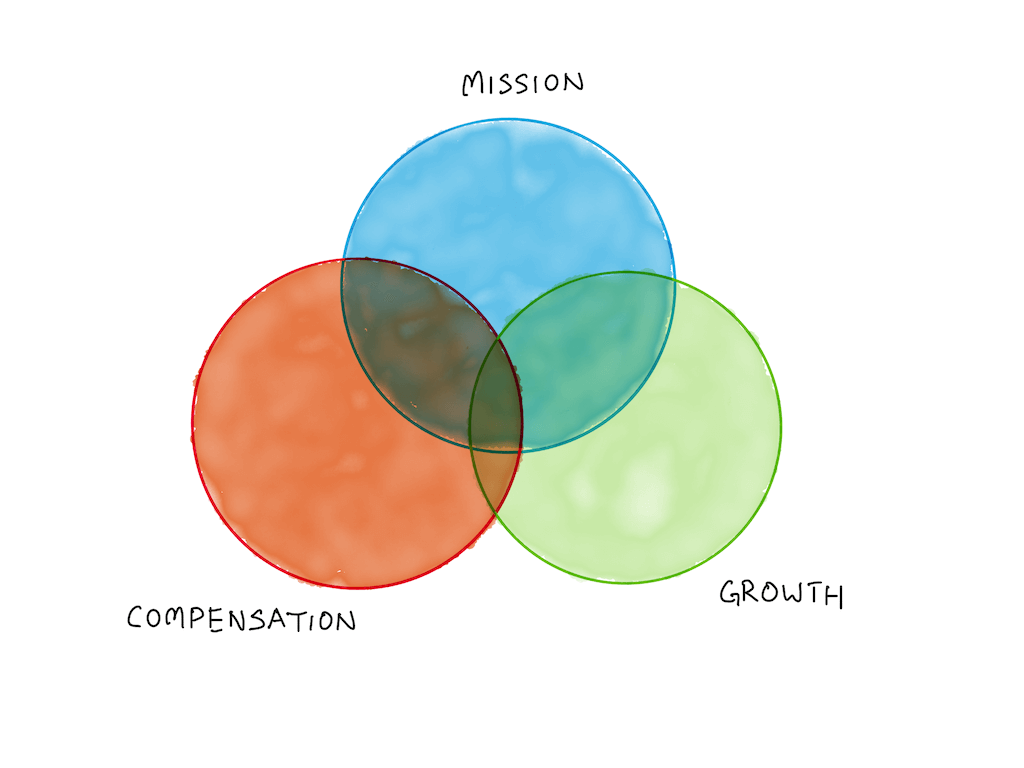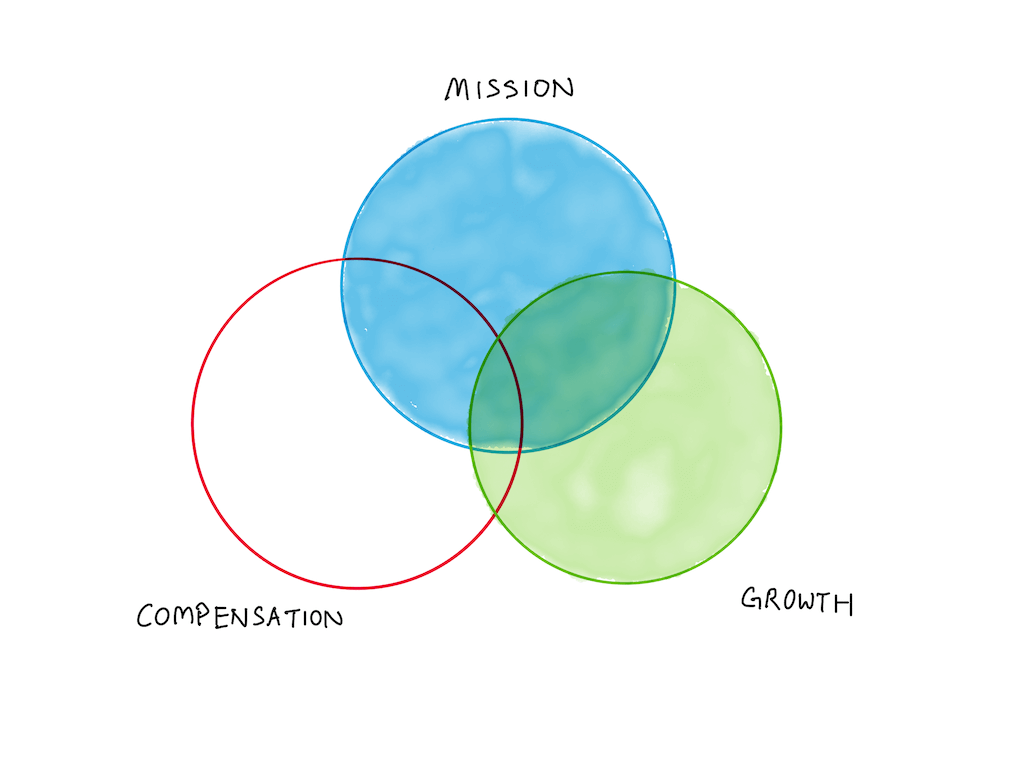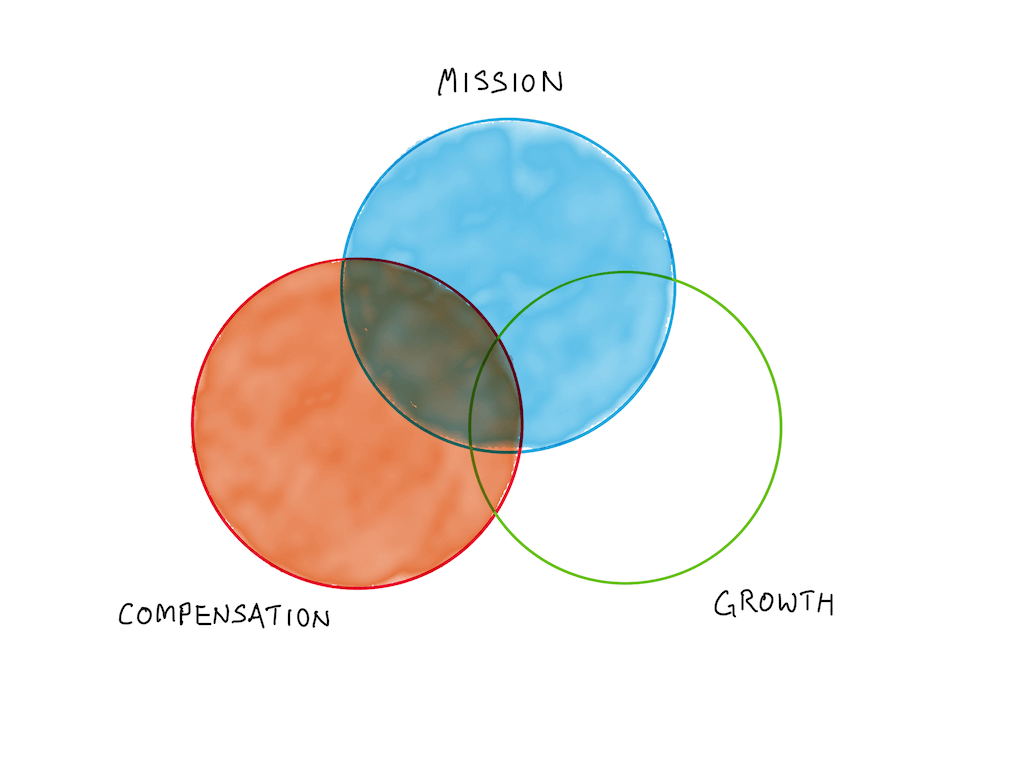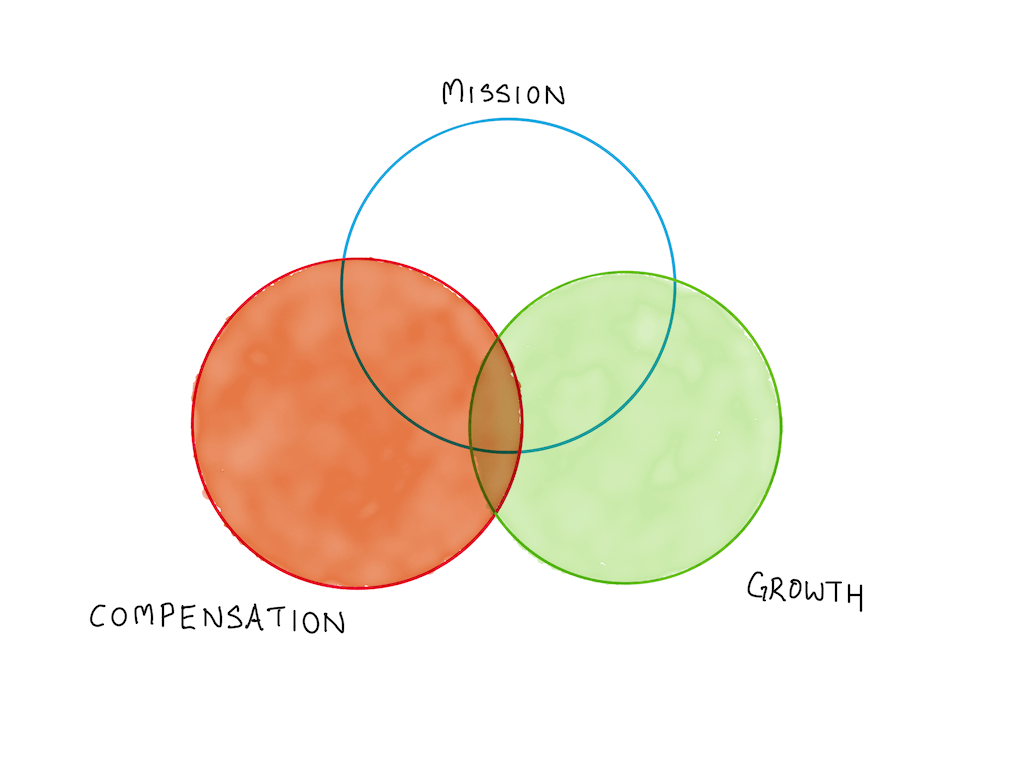Desire for mission is career-limiting in the same way that desire for a high salary is a career-limiting: by definition, it narrows the set of jobs that you apply to and take.
By itself, this isn’t a particularly interesting statement to make. In fact, it’s almost truistic: every additional requirement you add to your list of criteria during a job search reduces the set of jobs you might plausibly choose.
Where this idea becomes interesting, however, is when you realise that certain ‘career-limiting beliefs’ are optional: at various points in your life, you might want to add or remove certain beliefs, changing the mix of constraints that you have.
This, too, might appear obvious. But the reason I bring it up is because I deal with my fair share of fresh graduates, and I often ask them about their career plans during our one-on-ones. Too often, a large percentage of them tell me something like “I want to work for a company with a mission I can get excited about!” and I make a face and they look confused and ask: “Why? Do you have something against mission?”
To be clear: I don’t have something against mission. Rather, I believe that mission is an optional career-limiting belief. At the beginning of your career, or really whenever you face onerous career constraints (e.g. you have to support your parents or you’re stuck in a particular geographical location with a limited selection of jobs), dropping mission from your list of requirements is perfectly fine. I think that most of us who are further along in our careers know this instinctively. But I want to push back on the ‘mission is so important!’ ethos that seems to have seeped out from wherever it is that zeitgeists are made, because — if you believe this — it really isn’t as useful as you might think.
Adjust Your Constraints
For the sake of argument, let's say that an ideal job is one that pays well, that gives you a career path, and that allows you to make an impact on the world. I’ll call this ‘compensation’, ‘growth’, and ‘mission’ respectively.

(Note: this isn’t a complete description of an ideal job, merely one that I’m using to advance my argument. In reality, there are many other factors that go into job selection, such as ‘getting along with my colleagues’ and ‘gives me adequate health insurance’ and ‘allows me the family life I desire’.)
But let’s say that we consider just these three things. Let’s explore what happens when you remove each of these requirements.

Picking a job that doesn’t pay well has obvious consequences. In practice, this is ok if you still live like a student. It’s not ok when you have large financial burdens (duh) or if you’ve let yourself become accustomed to a certain standard of living. The first part is obvious, but the second isn’t; I have friends in banking or in large tech companies living cushy lives with cushy salaries, who are unable to come back down into startup or non-profit-land, regardless of the opportunities they find there.
My point here is that compensation preference can be fairly illiquid — you’re either ok with a low salary or you aren’t; and if you aren’t, there’s not much you can do about it.

Picking a job that gives you little-to-no valuable skills is even worse than picking a badly-paying job. We know that certain career decisions are like ‘investing’, and others are like ‘harvesting’. For instance, if you do a PhD in AI in a prestigious university, under a famous supervisor, you’re going to be paid badly and treated like slave labour for a number of years, after which you can harvest all the career capital you’ve gathered by ejecting out of academia and working in one of the many cushy AI jobs on offer in the tech and finance industries.
So a PhD in AI is a low-comp, high-growth career option. But think about the opposite version of this option. Say, you pick a well-paying job with limited growth opportunities — like working in retail, or signing up as a junior associate in a non-brand-name management consultancy. Will you learn certain skills? Of course you would … but none of them rare. Would such jobs lead to a career path down the road? This is not likely: retail jobs aren’t known for deep career ladders, and management consultancies must operate using an ‘up or out’ talent management policy, so you should expect to be out in a couple of years.
The truth is that whatever skills you learn in either job can’t possibly be rare and valuable: in the former, retail jobs are not known for teaching skills that are useful in today’s knowledge-first economy; with the latter, there usually isn’t enough time to become significantly good at something that matters. (The more nuanced take around that second option is that you might walk away with a generic set of ‘valuable’ analytical skills, but this isn’t rare, and you’ll lack the positive status distortions that working in a brand-name consultancy like McKinsey might give you).
Picking a job with limited growth opportunities is usually a terrible option in one’s early career. You might get lucky — you meet someone interesting or get an offer from a former client — but that option is net-neutral, at best. I think this is obvious enough to most people, so I’ll stop here.

This leaves us with mission. What happens when you pick a job with no mission? Or if you pick a company with a mission that you can’t get excited about?
The answer here, is: nothing. Sure, you might get disillusioned with the lack of impact your work has on society. Or you might get bored with your current job, and find yourself daydreaming about the excitement and meaning that comes from executing against a world-changing mission. But this isn’t exactly harmful — not in the same way that having bad comp or having no career path might be harmful for you. If you put in a stint at an ok-paying, high-growth job with no discernible mission, this still leaves you better off if you decide to leave for more mission-oriented pastures a year or two or four later.
Mission is optional. It’s a privilege. It’s amazing if you can find a job that pays well, teaches you rare and valuable skills, and allows you to execute against a world-changing, society-benefiting goal. But such jobs are incredibly rare! If you can’t find one, it seems reasonable to temporarily lift the requirement for mission. This is especially true in the early years of your career, or whenever it is you realise that you have a limited menu of options to choose from.
But let’s say that you absolutely must have mission in your next job. This implies ignoring all the jobs in companies with boring missions. Well — guess what — the majority of companies in a given economy aren’t ones with compelling missions! David Maister observes that all professional services firms eventually adopt the exact same mission:
“To deliver outstanding client service; to provide fulfilling careers and professional satisfaction for our people; and to achieve financial success so that we can reward ourselves and grow.”
Which isn’t particularly compelling; it doesn’t say “we want to cure cancer” or “we seek to rid humanity of crippling poverty” or “we want to make humans a space-faring species.”
Koch Industries, which operates in oil and gas and plastics and other evil things — which is to say, has tentacles in most of the industries we rely on for modern life — has a corporate mission that goes:
“The role of business in society is to help people improve their lives by providing products and services they value more highly than their alternatives, and to do so while consuming fewer resources. To the extent a business does this by the economic means, its profits are a measure of the value it creates in society. Creative destruction is inherent in a market system, so a business must not only continually improve the value it creates for customers and society, but do so significantly faster than its competitors.
Thus, to continue to succeed, our Vision is to improve the value we create for our customers more efficiently and faster than our competitors. This should enable us to generate the return on capital and investment opportunities needed to achieve a long-term growth rate that doubles earnings, on average, every six years. This necessitates significantly accelerating the application of MBM, becoming much more forward-looking in talent acquisition and development, remaining private and continuing to reinvest 90 percent of earnings, while conducting all affairs lawfully and with integrity.”
(I can already hear you snoring.)
My point here is that Koch Industries — for all the evil that its critics (fairly) say that it does — is more representative of a typical company than you might think. It provides us with heat and energy, lubricants and plastics, fertilisers and nylons — products necessary for modern living in a way that Google and Apple and Facebook are not. And yet all Koch can offer is a mission that seeks to ‘generate the return on capital needed to double earnings, on average, every six years’. (Which, well, at least they’re being honest about it.)
My wager is that you’re going to find more companies like Koch in the labour market than you are companies like Facebook. I’d argue that your expectations for mission should reflect this underlying reality.
Wrapping Up
I’m not the first person to have made this argument, and I don’t believe I’m the only one who thinks this way. Cal Newport’s So Good They Can’t Ignore You is a book-length treatment that says essentially the same thing; Newport asserts that you should build career capital in your early career, because you may then trade this capital with whatever you want later on: be it more autonomy, more money, or perhaps more mission.
Newport’s argument is sensible advice. But I think most people eventually come around to this point of view. When you’re older and find that you have to put your kids through college or support your aging parents, mission seems almost like an unnecessary luxury. And that’s not to mention the multitudes of people who enjoy their work with no need for a compelling mission, fully engaged in solving challenging problems in their jobs, getting value out of working in the company of people they enjoy.
When you’re young, you don’t gain as much if you optimise for mission. It is nice if you can find a great job at a mission-oriented company. But if you can’t, toss the requirement aside. I wager you can always pick it up again later.
Originally published , last updated .





